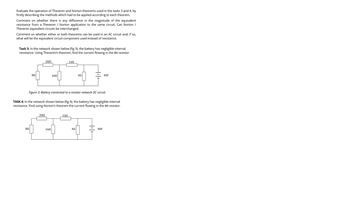
Introductory Circuit Analysis (13th Edition)
13th Edition
ISBN: 9780133923605
Author: Robert L. Boylestad
Publisher: PEARSON
expand_more
expand_more
format_list_bulleted
Question
Evaluate the operation of Thevenin and Norton theorems used in the tasks 3 and 4, by firstly describing the methods which had to be applied according to each theorem.
Comment on whether there is any difference in the magnitude of the equivalent resistance from a Thevenin / Norton application to the same circuit. Can Norton / Thevenin equivalent circuits be interchanged.
Comment on whether either or both theorems can be used in an AC circuit and, if so, what will be the equivalent circuit component used instead of resistance.

Transcribed Image Text:Evaluate the operation of Thevenin and Norton theorems used in the tasks 3 and 4, by
firstly describing the methods which had to be applied according to each theorem.
Comment on whether there is any difference in the magnitude of the equivalent
resistance from a Thevenin / Norton application to the same circuit. Can Norton /
Thevenin equivalent circuits be interchanged.
Comment on whether either or both theorems can be used in an AC circuit and, if so,
what will be the equivalent circuit component used instead of resistance.
Task 3: In the network shown below (fig 3), the battery has negligible internal
resistance. Using Thevenin's theorem, find the current flowing in the 80 resistor
80
8Ω
2002
200
160
160
120
Figure 3: Battery connected to a resistor network DC circuit
TASK 4: In the network shown below (fig 4), the battery has negligible internal
resistance. Find using Norton's theorem the current flowing in the 80 resistor.
120
452
4Ω
40V
40V
Expert Solution
This question has been solved!
Explore an expertly crafted, step-by-step solution for a thorough understanding of key concepts.
Step by stepSolved in 4 steps with 3 images

Knowledge Booster
Learn more about
Need a deep-dive on the concept behind this application? Look no further. Learn more about this topic, electrical-engineering and related others by exploring similar questions and additional content below.Similar questions
- LO: 1, 2, 4,5,6: Figure shows the resistors from the previous two examples wired in a differentway—a combination of series and parallel. We can consider R1 to be the resistance of wiresleading to R2 and R3. (a) Find the total resistance. (b) What is the IR drop in R1? (c) Find thecurrent I2 through R2. (d) What power is dissipated by R2?arrow_forwardI need part Barrow_forward
Recommended textbooks for you
 Introductory Circuit Analysis (13th Edition)Electrical EngineeringISBN:9780133923605Author:Robert L. BoylestadPublisher:PEARSON
Introductory Circuit Analysis (13th Edition)Electrical EngineeringISBN:9780133923605Author:Robert L. BoylestadPublisher:PEARSON Delmar's Standard Textbook Of ElectricityElectrical EngineeringISBN:9781337900348Author:Stephen L. HermanPublisher:Cengage Learning
Delmar's Standard Textbook Of ElectricityElectrical EngineeringISBN:9781337900348Author:Stephen L. HermanPublisher:Cengage Learning Programmable Logic ControllersElectrical EngineeringISBN:9780073373843Author:Frank D. PetruzellaPublisher:McGraw-Hill Education
Programmable Logic ControllersElectrical EngineeringISBN:9780073373843Author:Frank D. PetruzellaPublisher:McGraw-Hill Education Fundamentals of Electric CircuitsElectrical EngineeringISBN:9780078028229Author:Charles K Alexander, Matthew SadikuPublisher:McGraw-Hill Education
Fundamentals of Electric CircuitsElectrical EngineeringISBN:9780078028229Author:Charles K Alexander, Matthew SadikuPublisher:McGraw-Hill Education Electric Circuits. (11th Edition)Electrical EngineeringISBN:9780134746968Author:James W. Nilsson, Susan RiedelPublisher:PEARSON
Electric Circuits. (11th Edition)Electrical EngineeringISBN:9780134746968Author:James W. Nilsson, Susan RiedelPublisher:PEARSON Engineering ElectromagneticsElectrical EngineeringISBN:9780078028151Author:Hayt, William H. (william Hart), Jr, BUCK, John A.Publisher:Mcgraw-hill Education,
Engineering ElectromagneticsElectrical EngineeringISBN:9780078028151Author:Hayt, William H. (william Hart), Jr, BUCK, John A.Publisher:Mcgraw-hill Education,

Introductory Circuit Analysis (13th Edition)
Electrical Engineering
ISBN:9780133923605
Author:Robert L. Boylestad
Publisher:PEARSON

Delmar's Standard Textbook Of Electricity
Electrical Engineering
ISBN:9781337900348
Author:Stephen L. Herman
Publisher:Cengage Learning

Programmable Logic Controllers
Electrical Engineering
ISBN:9780073373843
Author:Frank D. Petruzella
Publisher:McGraw-Hill Education

Fundamentals of Electric Circuits
Electrical Engineering
ISBN:9780078028229
Author:Charles K Alexander, Matthew Sadiku
Publisher:McGraw-Hill Education

Electric Circuits. (11th Edition)
Electrical Engineering
ISBN:9780134746968
Author:James W. Nilsson, Susan Riedel
Publisher:PEARSON

Engineering Electromagnetics
Electrical Engineering
ISBN:9780078028151
Author:Hayt, William H. (william Hart), Jr, BUCK, John A.
Publisher:Mcgraw-hill Education,